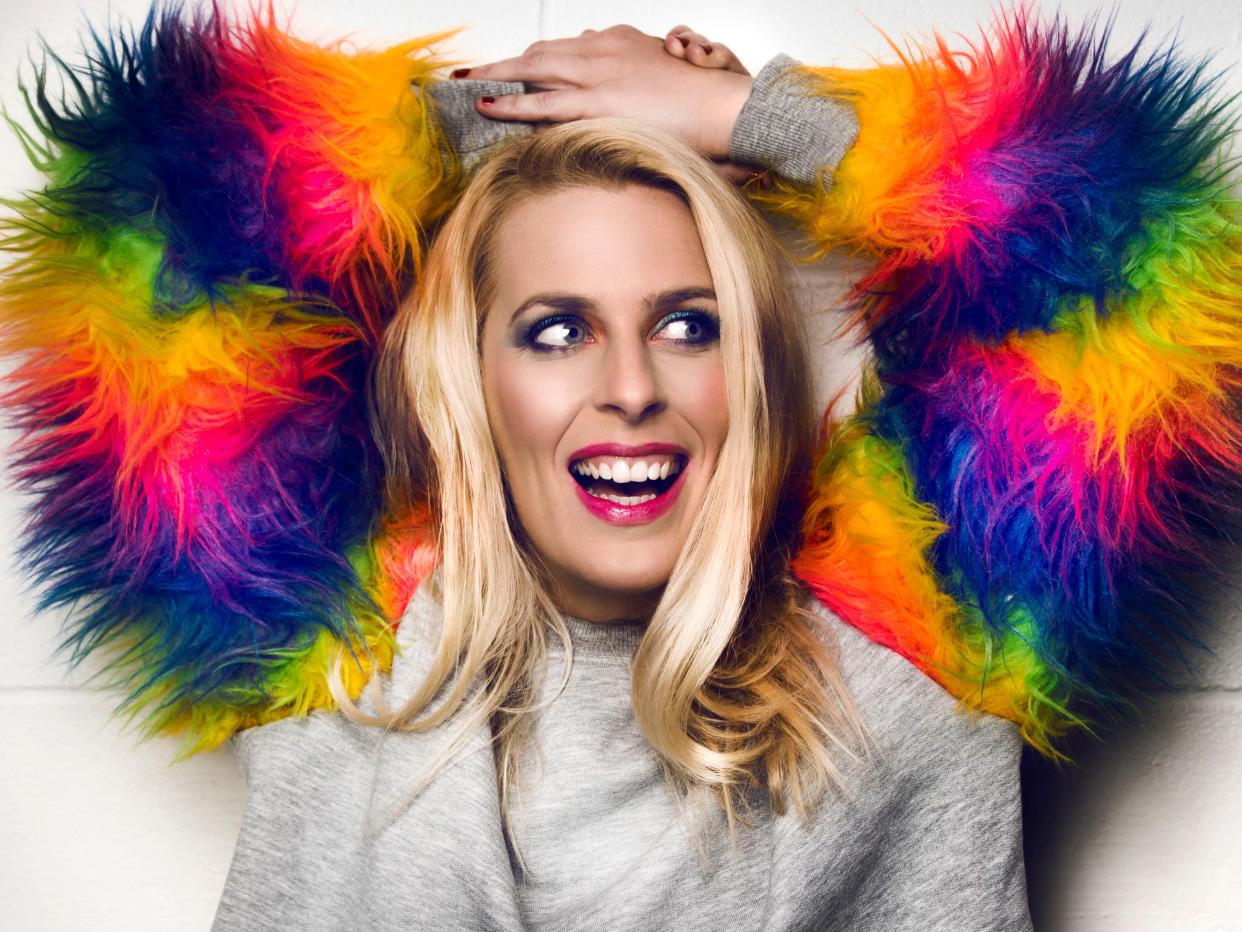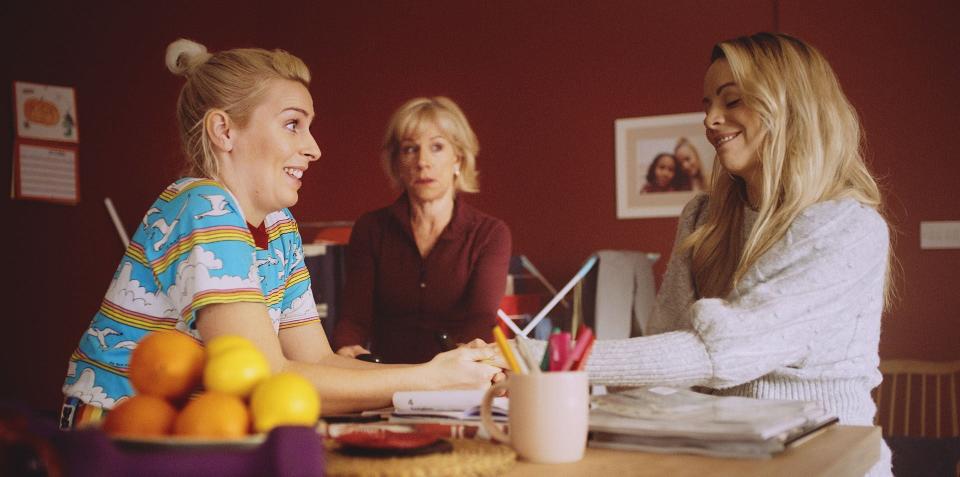Sara Pascoe: ‘Virtual stand-up gigs left me feeling mentally ill’

If you're going to have someone playing an abortion, then you should choose an actor that everyone wishes was dead,” is the advice Sara Pascoe was given when it came to casting the ghost of her teenage termination in her new BBC Two sitcom, Out of Her Mind. The comedian, who had a real-life abortion in her teens, wasn’t shocked by the comment, as some might have been, but rather ran with the idea. And who better to choose than – in his first screen role since Game of Thrones – Jack Gleeson, the actor best known for playing sadistic boy tyrant Joffrey Baratheon.
Having the ghost of an aborted child appear on screen may sound harrowingly out of place in a BBC Two sitcom, but Out of Her Mind is no ordinary comedy. Pascoe plays a version of herself that she describes as “100 per cent” true to life, trying to stop everyone from moving on without her as her sister (Fiona Button) gets married, her best friend (Cariad Lloyd) has a baby and her mum (Juliet Stevenson) dates again.
It’s a surreal and self-referential series, with the supporting characters regularly acknowledging that they’re in a TV show while Pascoe dresses up in bizarre costumes, interacts with animated characters and roller skates. This exaggerated style allows the 39-year-old to tackle big topics personal to her life, as she always has in her stand up and books. Monogamy, rejection and jealousy are all discussed through the lens of evolutionary biology, while also being presented empathetically.
Pascoe has explored this side of biology – the idea that humans are controlled by innate urges that are hard to fight against – in her 2016 book Animal, as well as Radio 4 series The Modern Monkey and BBC short Sara Pascoe vs Monogamy. She originally turned to evolutionary psychology while seeking out answers as a means of understanding her own behaviour. “I really hated that I was always jealous of boyfriends because it’s obviously about insecurity and you'd much rather be this chill person, but I wasn't like that,” she says. “Reading about the history of pair bonding and why jealousy existed, I had this drive to tell other people, ‘You don't have to hate yourself either!’ Nobody should hate themselves.”
Pascoe’s own abortion is one of the most personal storylines addressed in the show, but even with the darkly comedic casting, it’s handled with real care and nuance. “It’s not like I see pregnant people and think, ‘Oh yeah, I could have had a baby,’” her character tells the camera. “I don’t.” She’d always wanted to explore the complicated feelings that come with having an abortion in her work but felt stand-up couldn’t provide her with the three-dimensional model she needed to explore the topic as “a raw thing, but not a tragic thing”.

“When society has a binary conversation about abortion, there isn’t room for people who go, ‘I have very conflicted feelings because it was the right thing for me but it's still a sad thing or a thing I wish hadn't happened,’” she says. “People who have a termination are often seen as selfish, as aggressors who can’t ever let the softness in. You’re not allowed to go, ‘I did it. Oh, and it tore me to pieces.’ We don't have any room for that side of the conversation.”
There’s a catharsis for Pascoe in sharing this personal experience with a TV audience that she’s always found doing stand-up. “The reason you say the thing aloud is because actually what you're trying to show is correlation,” she explains. “It's a social thing. It's not like writing a diary, it's the act of recognition where you go, ‘Hey, I feel vulnerable about these things and here's a flippant joke’ and people laugh because they go, ‘Yeah, we all feel vulnerable sometimes.’ As any Zoom gig will teach you, it doesn't work to do it by yourself.”
Pascoe has missed live comedy in lockdown, listing green rooms, b****ing with other comedians and long car journeys as aspects she’s unexpectedly pined for. “You start to fetishise the things that you can't have,” she says. “I've been doing gigs recently that I would have turned down a year ago. Pub gardens, no microphone in the rain and I just go, ‘This is my true love.’”
It’s been a tough year for stand-ups, with tours pulled, the Edinburgh Fringe cancelled and small venues closing left, right and centre. It calls to mind a spookily prescient line from Out of Her Mind – which was entirely written and recorded pre-pandemic – in which Pascoe states: “The great thing about getting all your self-worth from your job is that if it all goes wrong, you’re not heartbroken, just poor.”
Considering she didn’t perform to an audience for months – and says that virtual gigs left her feeling “mentally ill” – the slowly returning, socially distanced events have scratched an itch for Pascoe. But it’s also hard to know whether to joke about coronavirus or not.
“All the comedians got burned by Brexit because everyone wrote stuff about Brexit, then said it to audiences who had come out to absolutely forget about Brexit. People were so surrounded by it, they didn't want to talk about it when they were out to have a nice time so a comedian giving them their opinion was like, ‘Shut up’. We don’t know whether Covid will be the same.”
Given that just last week Italian critics branded a comedy film written about the pandemic to be “demeaning”, it’s clearly an issue facing on-screen as well as live comedy. In a time of seemingly never-ending bad news and Teflon politicians, the ability of satire to mock and hold to account feels like it’s slipped. Pair that with reports of a drive to push left-wing “bias” out of the BBC’s comedy and the future of political satire appears uncertain.
Pascoe has appeared on her fair share of topical panel shows over the years, and while she is careful not to knock them, says she can understand the argument that the format itself may need refreshing. “Satire is supposed to be like, ‘Oh my god, this is a really powerful person and these court jesters are diminishing them, what dangerous, transgressive territory we’re in!’, but maybe there's no jeopardy because we're so used to it,” she says. “People make fun of Boris Johnson, but we don't worry about him losing his status because he's so safe, right?”
As for right-wing comedy on the BBC, Pascoe hopes it comes from creating new content, rather than complaining about what’s already on air. “I absolutely think comedy should always be this melting pot of voices because it's not supposed to be serious,” she says. “If it's really, really funny, people will laugh whether we agree or not; You can be a massive Jeremy Corbyn supporter, but when someone does an incredible joke about his terrible trainers, you laugh because that's a funny way of looking at it.”
She continues: “But if they make it and nobody likes it regardless of where they are on the political spectrum or if it comes across as unempathetic, then it's been proven that the audience wasn't there for it, rather than it's been kept out because commissioners have political bias.”
As for the future of comedy, Pascoe is surprisingly optimistic, but sees our current moment as an opportunity for change. “We've all had so much time to think about what's wrong with our industries, we've got the Black Lives Matter movement and conversations happening at the same time around representation and diversity and support,” she says. “We’ve had that huge conversation, so when we start putting those structures back in place, hopefully they will be better.”
Out of Her Mind begins on BBC Two on Tuesday at 10pm


